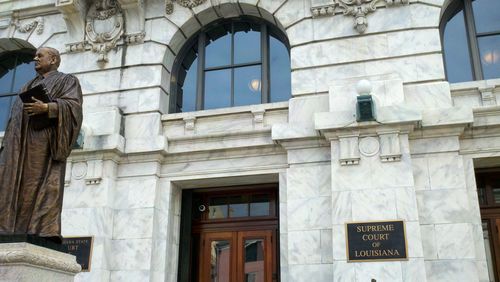A private pipeline did what pipelines often do: it started negotiating with property owners for the property needed, but at the same time pressed forward. It reached agreement with some owners, others not. It filed “expropriation” lawsuits (for it is in Louisiana that our scene lies). It started to build, even before judgments of expropriation.
Aaslestad, owner of 38.00 acres (more or less) sued the pipeline to enjoin further construction. He also asserted in the expropriation case a counterclaim for due process and trespass (again, this is Louisiana, so they call that a “reconventional demand). Trial followed.
The trial court issued a judgment of expropriation and concluded the takings were for a public purpose. But it also upheld the property owner’s trespass counterclaim. The owner’s interest was pretty minor, so the total award was a whopping $150. Seventy five bucks for the expropriation and the same amount for the trespass. No attorneys’ fees.
As we noted in this post (“Louisiana Court Slaps Down Pipeline for Just Going Ahead And Building Before Actually Taking Property“), the Court of Appeal was not too pleased with the pipeline. It upheld the expropriation but also held that occupying and starting the build on the property prior to a judgment of expropriation violated the owner’s due process rights. It didn’t matter that the interest was very small. The court entered a $10,000 judgment for the owner, and sent the case back down for a calculation of attorneys’ fees.
Not so fast, the pipeline argued in a writ petition to the Louisiana Supreme Court. We’re a pipeline, and the attorneys’ fees statute only applies to the government and its agencies. And besides, this case, while it involved takings, was not a compensation proceeding.
The Supreme Court agreed that the statute did not cover this situation: “By its plain language, La. R.S. 13:5111 does not allow for an award of attorney fees in this case, as it involves expropriation by a private entity. Specifically, we find that BBP is not an ‘agency’ of the state.” Slip op. at 5. Things looking up for the pipeline!
But hold on: maybe the statute doesn’t require a private condemnor to provide attorneys’ fees; but the Louisiana Constitution does.
The Louisiana Constitution of 1974 requires that landowners be compensated “to the full extent” of their loss, which “shall include, but not be limited to, the appraised value of the property and all costs of relocation, inconvenience, and any other damages actually incurred by the owner because of the expropriation.” La. Const. Art. I, § IV(B)(5).This article applies to both public and private entities and was amended in the Constitution of 1974 in order to encompass costs of litigation and attorney fees.
Slip op. at 5.
The constitution requires that all condemnors (not just public condemnors) make full and just compensation, which means attorneys’ fees. The court also held that the “specific procedural posture of the case” didn’t matter. Thus, the court also rejected the pipeline’s argument that the award of fees was in the owner’s inverse counterclaim, and not in the expropriation claim.
So check this out. We think the Louisiana Supreme Court got it right when it held:
While this Court has generally acknowledged that attorney fee awards are governed by statute or contract, we have also noted that there are exceptions to this rule. See e.g., Hernandez v. Harson, 237 La. 389, 409, 111 So.2d 320, 327 (1958) (discussing exceptions to the jurisprudential rule that attorney fees are not allowed except where authorized by statute or contract). Additionally, we note that “the constitution is the supreme law of this state, to which all legislative acts must yield.” M.J. Farms, Ltd. v. Exxon Mobil Corp., 07-2371, p. 22 (La. 7/1/08), 998 So.2d 16, 32(citations omitted). We agree with defendants that Rivet is inapplicable because it does not address the fundamental question presented herein: whether the Louisiana Constitution permits any award of attorney fees and litigation costs separate from any statutory authority explicitly authorizing an award of attorney fees and costs. We find that it does. Thus, under the specific facts of this case, we find sufficient support in the Louisiana Constitution to uphold the awards of attorney fees and costs.
Slip op. at 9-10.
We just wish more courts would see it the same way.
Bayou Bridge Pipeline, LLC v. 38.00 Acres, More or Less, No. 20-1017 (La. May 13, 2021)
